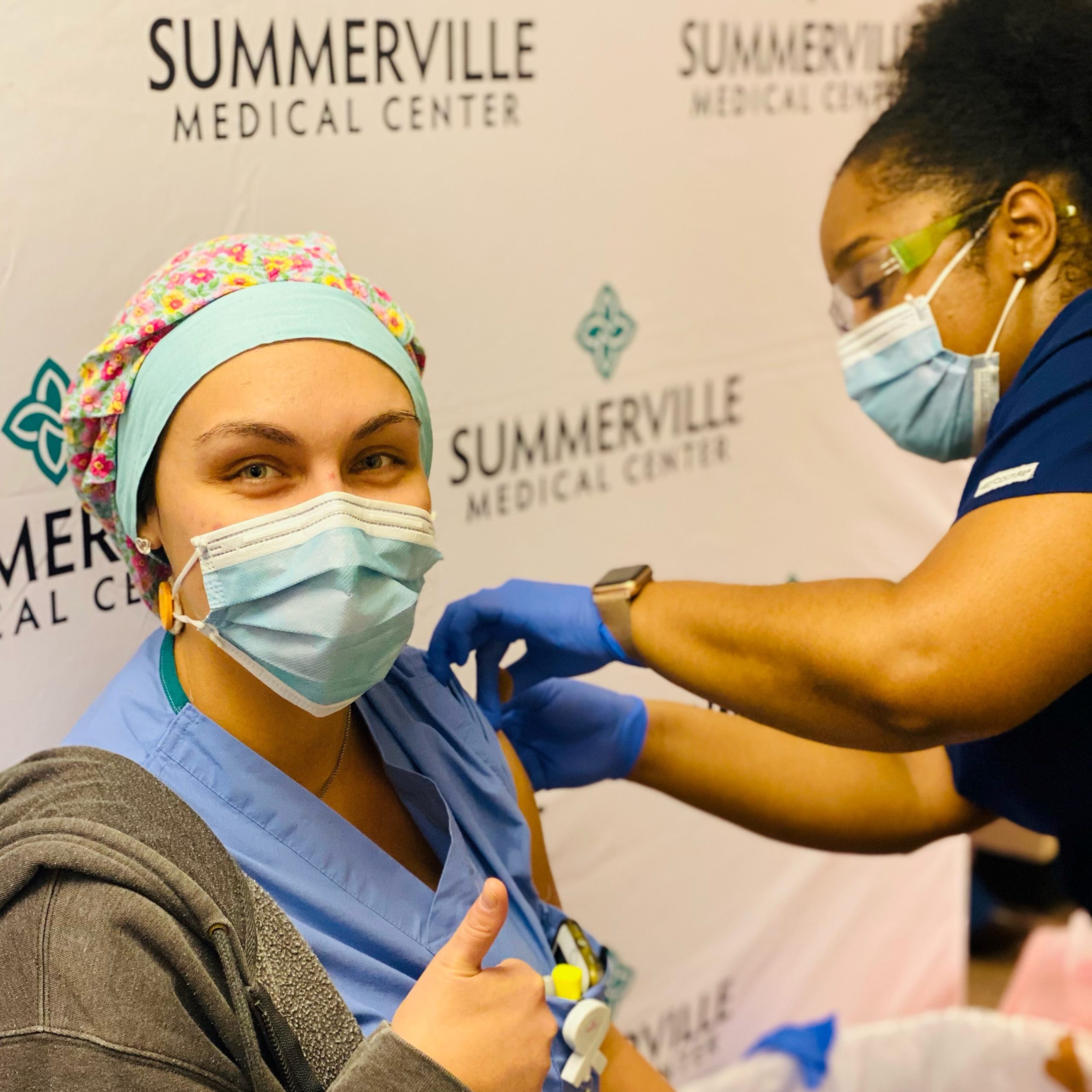When COVID-19 arrived in the United States earlier this year, it forever changed our lives. Healthcare workers on the front lines quickly proved themselves heroes and demonstrated their resilience time and again, even while coping with unprecedented scale and precarious personal circumstances. Nine months later, hope is finally here. HCA Healthcare colleagues began receiving the vaccine on Tuesday, signaling a turning point in the pandemic.
“Since the onset of COVID, our caregivers, whether at the very front lines or in supporting roles, have been selfless in answering the call to care for others,” said Dr. Jonathan Perlin, president of clinical operations and chief medical officer at HCA Healthcare. “The arrival of the COVID vaccine represents a pivotal moment in this pandemic. We know vaccines are the safest and most effective way to combat this virus, and we have implemented a comprehensive plan to distribute them – starting with our frontline colleagues.”
As states distributed the Pfizer/BioNTech COVID-19 vaccine to our facilities, our care teams on the front lines began receiving vaccinations. HCA Healthcare affiliate hospitals Alaska Regional Hospital, Presbyterian/St. Luke’s Medical Center, Sky Ridge Medical Center and HCA Virginia were the first to receive vaccine shipments on December 15. Dr. Vito Capotorto, chief of staff and hospitalist medical director for Henrico Doctors’ Hospital in Richmond, Virginia, was the first colleague to receive the COVID-19 vaccine among HCA Healthcare’s 185 hospitals. As of Jan. 6, 2021, all 16 HCA Healthcare divisions have received the COVID-19 vaccines with more than 130,000 colleagues now vaccinated.
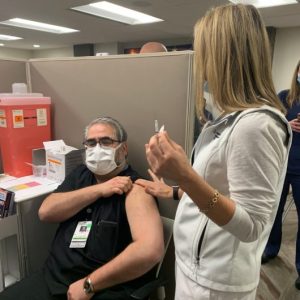
The Centers for Disease Control and Prevention (CDC) prioritized the vaccine for healthcare personnel who may have potential for direct or indirect exposure to patients or infectious materials. Given the critical role they play in caring for others, continued protection of caregivers at work, at home, and in the community remains a national priority.
When HCA Healthcare’s Grand Strand Medical Center in Myrtle Beach, South Carolina received its first shipment of the vaccine, Keerstyn Allen, a registered nurse in the hospital’s COVID intensive care unit, was one of the first colleagues to receive it. “I can’t begin to say how much December 16, 2020 means to me. I’ve never cried happy tears for a shot in the arm. Nine months of literal blood, sweat and tears – so many tears – has a light at the end of the tunnel,” said Keerstyn.
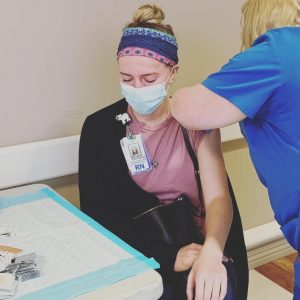
“I am forever grateful for the amazing, intelligent and hardworking people behind this vaccine,” Keerstyn continued. “Believe in science. Believe in this vaccine.”
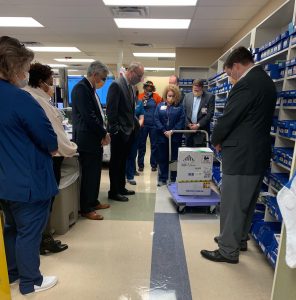
Yesterday, frontline caregivers from seven Nashville-based HCA Healthcare hospitals from the TriStar Division received their vaccinations in Tennessee. Dr. Tama Van Decar, chief medical officer at the TriStar Division, noted the excitement around the vaccine and explained what it means for healthcare workers.
“What’s exciting for us is we’ve been planning for the vaccine’s arrival, and now that it’s at our doorstep, I think everyone here has a sense of renewed energy, a renewed purpose, and a sense of honest excitement about what this could mean for us in healthcare broadly and for caregivers directly,” said Dr. Van Decar.
She continued, “I believe in this vaccine. I believe in this science behind this vaccine. I believe in the intricate process scientists and oversight bodies went through to review it. The vaccine is safe. The vaccine is 95% effective, this is an incredible tribute to our science.”
Salomey Agyemang, a registered nurse for TriStar Health, echoed those sentiments saying, “I feel really good. I feel encouraged. I feel hopeful. It feels like the beginning of the end of this.”
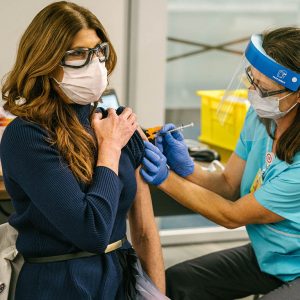
Find answers to some of the most common questions people are asking about COVID-19 vaccine below…
Q: What types of vaccines are available?
A: Two manufacturers, Pfizer/BioNTech and Moderna, have recently developed COVID-19 vaccines. Pfizer/BioNTech was granted an Emergency Use Authorization (EUA) by the U.S. Food and Drug Administration (FDA) on December 11. Moderna received an EUA on December 18 and is the second approved vaccine, which will be critical in our continued efforts to quickly vaccinate and protect our workforce.
Q: Is the vaccine safe to receive?
A: Both the Pfizer/BioNTech and Moderna vaccines are a new type of vaccine, but the technology behind them has been studied for decades. These vaccine types teach our cells to make the “spike protein” and train our immune systems to protect us from infection when the real virus enters our bodies. This type of vaccine cannot give you COVID-19 and does not affect or interact with your DNA.
Q: How were these COVID-19 vaccines developed so quickly?
A: Coordinated efforts by public and private partnerships helped accelerate vaccine development, but these accelerated efforts have not sacrificed scientific standards, integrity of the vaccine review process, or safety. Prior knowledge in vaccine development and advances in bioengineering were critical to the timeline, as well as government funding which decreased the monetary risk to companies, allowing them to develop and manufacture the vaccine concurrently with clinical studies.
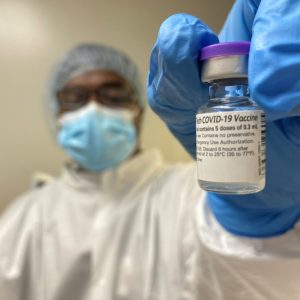
Q: Who will receive the vaccine first?
A: Based on national guidance, a “tiering” system is being used to prioritize those at greatest risk of exposure, particularly healthcare workers and long-term care facility residents. On December 1, 2020, the CDC recommended that healthcare personnel with direct or indirect exposure to patients or infectious materials receive a COVID-19 vaccine first.
Q: When will the general public receive the vaccine?
A: Experts began working during the summer of 2020 on a strategy for distributing these limited vaccines in a fair, ethical and transparent way. Vaccines have been allocated to each state based on population. Each state is responsible for developing a distribution plan. Therefore, distribution plans and timelines will vary by state. For those receiving the Pfizer/BioNTech vaccine, two doses are required separated by 21 days. Check with your local health department for updates.
Q: Why is it important to get the vaccine?
A: Based on what we know about vaccines for other diseases, experts believe that getting a COVID-19 vaccine may help keep you from getting seriously ill, even if you do get COVID-19. Getting vaccinated yourself may also protect people around you, particularly people at increased risk for severe illness from COVID-19. Stopping a pandemic requires using all the tools we have available. According to the CDC, the combination of getting vaccinated and following CDC’s recommendations to protect yourself and others will offer the best protection from COVID-19.
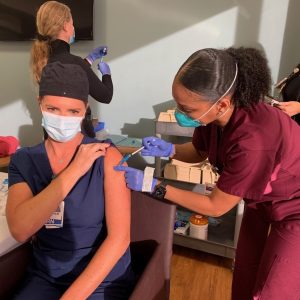
Nashville-based HCA Healthcare is one of the nation’s leading providers of healthcare services, comprising 185 hospitals and approximately 2,000 sites of care, including surgery centers, freestanding ERs, urgent care centers, and physician clinics, in 21 states and the United Kingdom.

